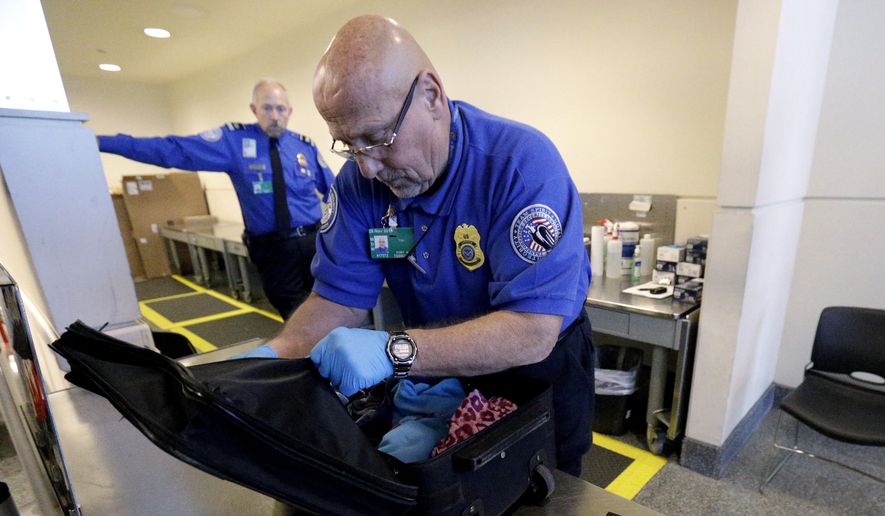As whistleblower complaints in the Obama administration soar to record levels, one of the latest actions involves a federal agency intervening on behalf of two Transportation Security Administration managers who say they were punished after exposing major security problems at the Minneapolis-St. Paul International Airport.
The Office of Special Counsel is investigating the complaints of assistant federal security directors Andrew Rhoades and Becky Roering, who say they faced retaliation from supervisors after blowing the whistle on airport security lapses such as improperly handled ammunition found at TSA checkpoints and inadequate background checks on certain travelers.
Mr. Rhoades even contends that TSA workers routinely manipulate wait times for passengers shuffling through airport security lines, to make it appear that agents are screening travelers faster than they really are.
After their complaints went public, Mr. Rhoades said, he was punished by the top TSA official at the Minneapolis-St. Paul airport, Federal Security Director Cliff VanLeuven, who ordered him to be transferred to Tampa, Florida.
“It was a total shock,” Mr. Rhoades said in an interview. “They couldn’t get me on a performance issue, so they reassigned me to try to get me to resign.”
Ms. Roering was suspended twice after raising her concerns about security.
SEE ALSO: VA poor patient care whistleblowers see retaliation in being paid to do nothing
But the Office of Special Counsel has intervened, blocking the transfer of Mr. Rhoades and halting Ms. Roering’s suspension late last month while the agency investigates their complaints.
Voicing a complaint that is common in the Department of Veterans Affairs and other large federal bureaucracies lately, Mr. Rhoades said the climate of retaliation against TSA employees in Minneapolis is so pervasive that it’s affecting the agents’ performance in a job where attention to detail is crucial.
“Overall security at MSP has precipitously declined, and most of the staff is absorbed with avoiding retaliation rather than focusing on their jobs,” he told the Office of Special Counsel.
A TSA spokesman declined to comment on the specific whistleblower complaints, but the agency said in a statement that public safety has not been affected.
“Today, air travelers are subject to a robust, multi-layered security system seen and unseen, including intelligence gathering and analysis, cross-checking passenger manifests against terrorism watch lists, checkpoint screening, random canine team screening at airports, reinforced cockpit doors, federal air marshals, armed pilots and a vigilant public,” the agency said. “In combination, these layers provide enhanced security creating a much stronger and protected transportation system for the traveling public.”
Complaints of retaliation against whistleblowers in the federal government are increasing. The Office of Special Counsel said it has experienced an “unprecedented rise” in its caseload, with 5,200 complaints filed in fiscal 2014, a 17 percent increase from the previous year and a 30 percent rise from three years ago.
The VA is the leading source of complaints filed with the Office of Special Counsel, with 1,504 cases in fiscal 2014. The Defense Department is next, with 1,365 cases last year. The Department of Homeland Security is third, with 489.
Analysts say retaliation against employees who speak out is common, in spite of Cabinet secretaries such as Bob McDonald at the VA publicly encouraging them to come forward.
“Whistleblowers are not the most beloved people by their leaders,” said Steven Bucci, an analyst on homeland security at The Heritage Foundation. “Unfortunately, the system that protects them is really imperfect. Rather than get the corrective action, instead you end up seeing organizations expend more effort to screw with the person who raised the issue.”
The complaints about security at the Minneapolis-St. Paul airport came to light last year. Mr. Rhoades told supervisors that TSA stickers were not being placed on checked bags that TSA had inspected, and that ammunition confiscated at TSA checkpoints was not being properly secured.
Ms. Roering said background checks of passengers applying for TSA “PreCheck” status — which allows them to pass through security lines more quickly with less-rigorous screening — were being improperly and inadequately conducted.
But Mr. Rhoades said that rather than correcting the reported security lapses, his supervisor accused him of leaking information to a local TV reporter. Then he was told he was being transferred to Tampa, a move he said would have resulted in losing custody of his child.
Mr. Rhoades said he knows of “dozens” of senior TSA employees who have been ordered to accept the “directed reassignments” in far-away job postings, in the management’s hope that the employees will simply quit instead.
• Dave Boyer can be reached at dboyer@washingtontimes.com.




Please read our comment policy before commenting.